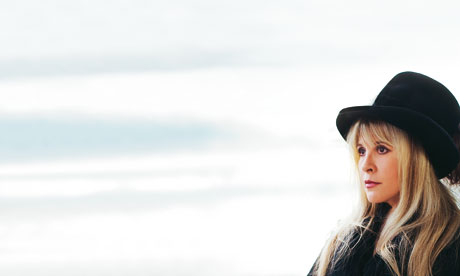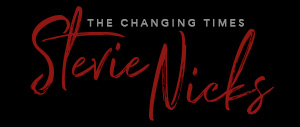…Dedicates New Album to Fan Who Succumbed to Cancer

Source: Spinner.com by Mike Doherty
After Stevie Nicks released ‘Trouble in Shangri-La’ in 2001, she thought she’d never record another solo album again. The process was tiresome and besides, she still had her longtime band Fleetwood Mac to satisfy her musical creativity.
Now, 10 years later, she’s back with ‘In Your Dreams’ — a rich, dynamic album co-written and co-produced by Eurythmics guitarist Dave Stewart, and featuring Fleetwood Mac’s Mick Fleetwood on drums and ex-boyfriend Lindsey Buckingham on guitar and vocals. From a San Francisco hotel room, on a rare night off from her recent tour with Rod Stewart, Nicks told Spinner about gaining inspiration from a lost friend, how recording this album changed her life and why she and Lindsey are like Bella and Edward from ‘Twilight.’
On your recent tour with Rod Stewart, was there a friendly rivalry between the two of you? Would you ever tell him before a show, “I’m going to go out and wipe the floor with you tonight?”
Oh no, you would never say something like that to Rod Stewart [laughs]. Even though he’s only a few years older than me, he is from a generation before me. Rod Stewart was a big rock star before Lindsey [Buckingham] and I even moved to Los Angeles. He was one of my big inspirations: Rod Stewart, Led Zeppelin, Janis, Jimi …
You and Lindsey got a record deal in 1972 as Buckingham Nicks. Would you have been signed in 2011?
The music business is in terrible shape right now because artists don’t sell ten million albums anymore. [Labels are] not making all that money, so they can’t have a whole slew of bands that they’re helping and developing. Lindsey and I were really lucky. I was just a waitress for four years, and he wasn’t [working]. It was okay because we worked on our music, we had a four-track Ampex tape recorder, and we were able to survive.
But I don’t see how the kids can do it today. I feel sorry for them. I want it to happen, because in 20 years, I don’t want everybody to be just listening to the Rolling Stones and Fleetwood Mac and Led Zeppelin; I want this generation to have their own rock stars that last. But it’s going to be very hard for the kids that are popular right now to still be doing this when they’re 40.
We’re so used to hearing about how your albums have had difficult gestation periods, but you’ve said that making ‘In Your Dreams’ was great — it must be a relief.
Well, this is how it should be. When you make records with Fleetwood Mac, they’re difficult. That’s not to say they’re not amazing — they obviously are, and that’s why I am famous; every time I drive up to my gorgeous house, I go, “This is the house that Fleetwood Mac built.” So did we argue? Yes. Did we have fights? Yes. But was the music that came out of it fantastic? Yes. However, it was difficult.
Even making my own records — between ‘Bella Donna’ in 1981 and ‘Shangri-La’ in 2001 — was difficult. [With this album], I have been reminded that you can make great music and have a good time doing it, and that you don’t have to be heartbroken and freaking out. [You can] go back to your poetry from the last 30 years, and if you want those passionate, crazy moments, you can find them in your writing.
How did you start the process?
Dave Stewart came over to my house in the Palisades, and I gave him a binder of my poetry and said, “See if there’s anything that appeals to you.” Dave always has a guitar around his neck, and he started playing, and I just sort of started reciting my poetry, and all of a sudden, in about an hour, we had this amazing song.
I have never been interested in writing with anybody — not Lindsey, not anybody. And all of a sudden, I could actually understand why Lennon and McCartney wrote together, or Rodgers and Hammerstein, or any of the great songwriting teams. I don’t know 1000 chords, and Dave doesn’t have a book of 40 poems. When you put those two things together, you have this amazing amount of wisdom and knowledge. Those five minutes where it all started was a brilliant moment. Stars went off. When it was done, I said, “Well, I’m a changed woman.” And we just continued.
We filmed the whole thing. Dave’s an amazing cinematographer. He is like a child: he sees the world as a place filled with stars and moons and ideas. It very much rubbed off on me and all my people. Every night, my goddaughter would cater dinners for 10 or 12 people, and it reminded me of what I think it must have been like in Paris in the ’20s, where you would have all those crazy artists: Coco Chanel and Man Ray, and [they] would sit around a big, long table and have these amazing dinners and talk about politics and art. We actually did that, and we filmed it. It was the way everybody should live. It was a sparkling moment that forever will live in my heart, and I want to leave this behind to the next generation.
The song ‘Moonlight (Vampire’s Dream)’ was influenced by ‘Twilight: New Moon,’ and the album teaser, with its vampires, is a bit like ‘True Blood.’ The rise of fantasy in pop culture right now seems to resonate with your own longtime aesthetic. Is America catching up to you?
I think they are. The first and the third verse in ‘Moonlight’ were written in the mid-’70s. The second verse — “She’s lonely, lost, and disconnected” — was written in Brisbane right after I saw the movie. So the song, really, is ancient times up to today.
The chorus — “It’s strange, she runs from the ones she can’t keep up with” — is all about the love affair between Bella and Edward [in ‘New Moon’]. But “Some call her strange lady from the mountains/Others say she’s not really real,” that’s written in 1976. The same with the third verse: “He loves her, but he loves his life alone as well” — people would think that was written about Edward, but it was written about Lindsey. So this really is an ancient song that encompasses my strange and everlasting relationship with Lindsey Buckingham, and Bella and Edward, all mixed into one.
There was something vampiric, then, between you and Lindsey?
It is! Our love affair. As much as we fight and have our differences of opinion on almost everything, if anything were to happen to either of us, I would be the first one there and he would be the first one here. So it is a story [about how] love never dies.
‘Cheaper Than Free’ ends ‘In Your Dreams’ and you and Dave Stewart sing, “What’s more important than freedom?/Being needed.” A simple couplet, but it sounds meaningful.
We went to Village Recorders [in L.A.] to do our basic drum and bass tracks, and Reese Witherspoon came down. Dave was [going to be] taking a week in Nashville to do some recording, and she said, “Well, I have a condo there, and if you want to stay there, you can.” I said, “That would be cheap, Dave.” And Reese said, “What’s cheaper than free?” And Dave Stewart and Stevie Nicks looked at each other and went, “Oh my God! What a great country song this could be.”
I thought it was going to be a tongue-in-cheek goofy song, and it ended up to be anything but. We were both very surprised. I believe in my heart that that song will live on forever. I said to everybody, “We have to really treat this song with kid gloves, because this may be the best song that [the duo of] Dave Stewart and Stevie Nicks ever does.”
‘In Your Dreams’ is dedicated to “Sara, my sweet girl,” tell me about her?
Sara was a girl that had a very rare kind of cancer, and our friend Lisa Loeb connected me and her parents. They brought her to a show, and we became very close. She was about 21 when I met her, and she’d been fighting this cancer since she was 17. I was in very close contact with her and her parents through three years. In 2008, [after a Fleetwood Mac tour], I flew to Pennsylvania and spent a day with her. She died three days later.
I lost my best friend to leukemia 30 years ago. There was a very similar feeling, except that when I lost Robin [Anderson], I was on the road and everybody was high, so it was horrible. I never got to really grieve about that because I was in the midst of this whole big Fleetwood Mac thing. But when Sara died, I was in Mexico in a very quiet house, and I was hit extremely hard. She loved my music so much, and she wanted me to do another record so much, and I was still on that “I’m never going to do another record” kick.
I just loved her so much, and it was very hard to lose her. She fought a really good fight between 17 and 24, and I dedicated the record to her because I felt in so many ways that it belonged to her.
Hence all the references to angels on the album?
Well, I don’t know. I felt her presence very strongly when we were making this record, and I felt that if I’d had a daughter, she would have been very much like this girl. I will write a song about her the next time. I’ve written many, many poems about her, but to write a song about her — I don’t want it to be sad; I want it to be about how brilliant she was. That takes a little while.
Looking back on your life, is there one moment that makes you proudest or happiest?
The opposite of regret is this record, because I didn’t really think it was possible to make a record like this. My greatest joy was that I was able to do something that proved I can continue to do this for another ten years. [Beforehand], I really felt I don’t want to do this anymore, because it’s just a lot of work, and I’m not very happy with what I come out with. Maybe I’m going to flip into “I’m an artist; I have 40 pieces of art that I think are really good,” or “I’m a poet. I’m going to write a poetry book,” or “I’m going to write the story of my life,” or “I’m going to make a book of letters that I’ve written to people over the last 30 years.”
This [album] has changed my life — it has made me go, “I can’t wait to make another record.” I would like to start tomorrow, go back to my house and just tell everybody to be there Monday.
A lot of regrets that I had got wiped out by this last 12 months.
